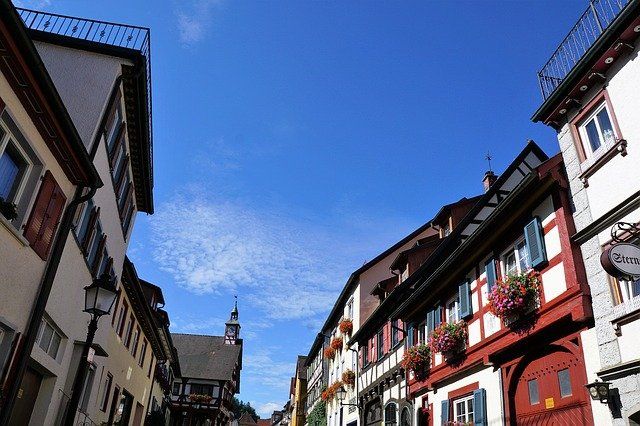
Three hundred years ago, on 25 November 1697, in the town of Mörs in Prussia, merchant Heinrich Tersteegen rejoiced at the news that his wife had given birth to a son, Gerhard. His parents hoped to give him the education necessary to become a minister of the Reformed Church in Germany, but they were unable to fulfil their plans because Heinrich died when his son was six years old. Gerhard’s mother was able to send him to the Latin (grammar) school at Mörs, but could not afford to send him on to university. Accordingly, after a good basic education, he left school at sixteen and was apprenticed to a relative who was also a merchant.
After four years Gerhard commenced trading as a merchant on his own account, at Mühlheim. His work took up a great deal of time, with no set hours and much travelling. Gerhard had never been strong in health, and he looked for another kind of employment. He had been converted through the influence of a friend whilst a merchant, and he wanted more time for meditation on the Word and devotion to his Lord. He therefore left the merchant business in 1719 and learnt linen weaving, following which he set up his own business of weaving silk ribbons. This was easier work and brought in enough money for him to live on. He could choose his own hours and work at home, where he lived alone, preferring the quietude. Sometimes he spent whole nights in prayer and communion with his Lord.
Tersteegen has been accused of being a mystic, but this can be explained by his deep experimental knowledge of Christ, which some simply could not understand. Those who knew him told of Gerhard’s simple way of life: he would not use tea or coffee, and consumed little more than milk, water and meal. The money thus saved he gave away to the poor. His relations were embarrassed by this strange manner of life and refused to acknowledge him. When he was ill, therefore, he suffered much through lack of proper food and care.
From 1719 to 1724 Gerhard went through a time of spiritual doubt and depression, during which he often feared himself lost and beyond the mercy of God. Friends were praying for him, but he could find no comfort in what he called his ‘state of darkness’ until, in 1724 just before Easter, he was travelling to another town nearby. On the way he received such a revelation of the love of Christ to him personally, that all his doubts immediately vanished, and from then on he rejoiced in complete assurance of the love and goodness of Christ his Saviour. Peace and joy characterized his life after this; the Lord Jesus was his all-in-all, and he had a deep realization of the manifest presence of God in his soul. This is shown in many of his hymns and poems; three of the best-known translated hymns begin:
‘Lo, God is here! let us adore,
And own how dreadful is this place!…’
‘Though all the world my choice deride,
Yet Jesus shall my portion be…’
‘Thou hidden love of God, whose height,
Whose depth unfathomed, no man knows…’
In another hymn he wrote of the righteousness of Christ:
‘Forgotten every stain and spot,
Their memory past and gone,
For me, O God, Thou seest not,
Thou lookest on Thy Son.’
The love of Christ within him turned him into an ardent evangelist:
‘Come, weary sinners, great and small,
The open door stands wide,
The blessed heart that welcomes all,
The Lamb of God, Who died.’
These deep experiences, first of the darkness of doubt and then of the assurance of Christ’s love, gave Gerhard a wonderful sensitivity, enabling him to understand, help and strengthen others who were in need of spiritual or natural help. As he was filled with the Holy Spirit, the love of Jesus flowed through him to others. From morning till night people flocked to him for counselling, and often there were twenty or more persons waiting in his outer room for a chance to speak with him.
By this time he had ceased to attend the Reformed Church; one reason was that he felt unable to partake of the Communion with those living in open sin. He started speaking to a few friends privately, expounding the Word of God. He began this work reluctantly and in a quiet way, but more and more heard about it and came to hear him on every possible occasion. In 1725 he took in a young man, Heinrich Sommer, to live with him and help in the ribbon-weaving. They worked ten hours each weekday at the loom, but besides this, Gerhard set aside two hours daily for private prayer, and spent the rest of his time studying the Word, writing devotional prose or poetry, and addressing his growing congregation.
Soon he had to give up the weaving altogether, as his ministry increased, but friends helped him with money. Much of it he refused, but now accepted a small regular income.
Gerhard did not confine his speaking to Mühlheim, but travelled the district around, addressing meetings of Christians or anyone who came to hear the Word. He set up in his house a dispensary of medicines, which he compounded himself, and gave them to help the sick poor. This work increased so much that he had to employ an assistant to help in the dispensary. He also went annually to Holland to visit Christians and encourage them in the Lord. From 1730-1750 a law against holding conventicles was strictly enforced in his home country and he could not hold meetings except on his visit to Holland. Nevertheless his counselling work continued and increased. After 1750 Gerhard resumed his public speaking until stopped by serious illness in 1756. Said to be caused by the exertion of so much speaking, this illness was nearly fatal but he recovered sufficiently to continue writing, although he was unable to travel or address large audiences. Hundreds wrote to him; people constantly bought up new editions of his hymns and other sacred works, and requested more.
Gerhard remained outside the Reformed Church to the end of his life, but never joined any group nor started one himself, although several tried to persuade him to join them (particularly the Moravians). He wrote: ‘My religion is this, that as one reconciled to God by the blood of Christ, I suffer myself to be led by the Spirit of Jesus, through daily dying, suffering and prayer, out of myself and all created things, that I may live alone to God in Christ…’ He died at Mühlheim on 3 April 1769.
The following hymn (part of a longer poem) sets out the thoughts of those who know the blessing of the full assurance of the love of Christ that passes knowledge (Ephesians 3:14-21). May we all seek and find this knowledge of Christ in our own lives.
Name of Jesus! highest Name!
Name that earth and heaven adore!
From the heart of God it came,
Leads me to God’s heart once more.
Name of Jesus! living tide!
Days of drought for me are past;
How much more than satisfied
Are the thirsty lips at last!
Name of Jesus! dearest Name!
Bread of heaven, and balm of love:
Oil of gladness, surest claim
To the treasures stored above.
Jesus gives forgiveness free,
Jesus cleanses all my stains,
Jesus gives His life to me,
Jesus always He remains.
Only Jesus! fairest Name!
Life, and rest, and peace, and bliss,
Jesus, evermore the same,
He is mine, and I am His.
(Grace Hymns 141, Christian Hymns 144).












